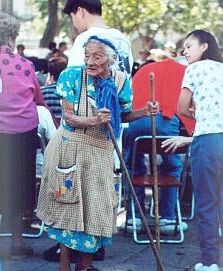
|
 |
They are wending their purposeful way among the tables, along the sidewalk facing the square. Their hands are out. We have a bit too much, and they have much too little. Some are children, some old beyond imagining; some lame, some halt, some blind; some with missing limbs; some singing, some playing instruments; some selling something, some telling tales; and some just plain sticking that empty hand in your face and glaring at you. Beggars are God's way of telling you that it's time to share the wealth.
Regardless of their age, their method, or their attitude, they all have certain things in common: they are shorter, darker, and less educated than the average Mexicano. They are, by and large, at the bottom of the social ladder: Las Indigenas, the native peoples.
Although the lines often blur, beggars can be divided into three groups: performers, sellers, and talkers. Performers come in two varieties: the ones you pay to perform, and the ones you pay to go away. In any given night, you can experience a Mariachi band, complete with brass section, that looks as if it just left the set of a major motion picture; or two blind guys with one beat-up guitar, one wheezy concertina and a seeing-eye child. The surprise is that the mariachis can't sing in the same rhythm, let alone the same key, and the blind guys are a total gas.
The sellers come in two varieties: real and phony. The real ones sell chiklets, carved wooden spoons, little onyx figurines, pieces of orange resin said to be amber, and other kinds of cheap junk. Their prices are too high sometimes, but it's not their fault. They don't have any money, so they are forced to buy their goods in small amounts (more expensive), on credit (for which there is an extra charge). The phonies carry a box of chiklets, but they really don't expect you to want any: the gum is just a way of introducing the handout pitch. One time, just for fun, I requested the gnarled, wrinkled, midget grandmother who took my peso to actually give me my chiklet. She looked at me like I was crazy. When I insisted, she reached into her tray, and with her gold tooth winking on and off with her mirth, handed me this cracked, grimy, chipped piece of gum. I took one look at it and put it in my shirt pocket. "Mas tarde" (later), I said. She cackled and moved on, hoping that I had learned my lesson.
The talkers come in two varieties: the ones who stand there and plead, and the ones with a story to tell. The stories are every bit as gut wrenching as you might suppose, full of dead children and hopelessly crippled husbands. Probably, they are true. Life is cruel in the third world, and there is no shame in begging.
Norteamericanos are very uncomfortable with beggars, having been taught that begging is shameful. Not so the Mexicanos. They look the beggar in the eye, and ask questions. Then they decide what, if anything, to give. When they give, they are usually more generous than we are.
My favorites are two sisters, about 10 and 5. They are well-groomed and in clean clothes. The older one approached me one evening with a long face and her hand out, and whimpered a tale of abandonment and life on the streets. Meanwhile, little sister, standing behind her, got distracted by the Mariachi music, and began to dance, with the most beatific smile on her face. I started to grin, and big sister wondered how anyone, even a heartless Gringo, could find amusement in such a tale of woe. She turned to her sister, and all was revealed. She raised her voice, and in Spanish too rapid for me to follow, admonished her. Little sister expressed her contrition, and made a pitiful face. Big sister turned back to me, and started over. Little sister, no longer able to contain herself, started to dance again. Big sister sensed this, broke off, and took her arm. They disappeared around the corner. Later, I saw big sister working the crowd by herself. I looked around for little sister. She was dancing, near the mariachis.
(July, 1994)
| "Letters From Oaxaca, México" | "The Oaxaca / México Newsletter" | Diana's Photo Album | Free Advice |
| Other Interesting Websites | Give Us A Piece of Your Mind | Orientation To Oaxaca | Frequently Asked Questions |